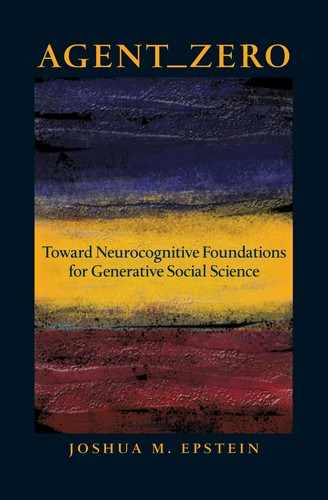THIS RESEARCH WAS SUPPORTED entirely by a National Institutes of Health Director’s Pioneer Award (DP1). This afforded me unparalleled scientific freedom and resources to found a new Center for Advanced Modeling in the Social, Behavioral, and Health Sciences at Johns Hopkins University, where this research was primarily conducted. For these exceptional opportunities, I am eternally grateful to the NIH. The Center would not have been possible without the vision and support of Dr. Gabor Kelen, Chairman of the Department of Emergency Medicine, to whom I am profoundly grateful. I also wish to thank my colleagues in the department for the climate of uncompromising excellence in which it is my privilege to work. My closest colleague in this project has been Julia Chelen, whom I thank for superb research assistance and invaluable consultations throughout. For detailed reviews of the manuscript, I am indebted to Robert Axelrod, Jon Parker, and Lisa Feldman-Barrett. For important reactions, from a variety of scientific perspectives, I also thank Paul Smaldino, Eili Klein, Michael Makowsky, David Broniatowski, and Erez Hatna. I am grateful for numerous sessions on learning theory with Peter Holland. For many formative discussions and for cohosting a two-day NIH Workshop on the model, I thank John Cacioppo. For their many insights and comments, I am grateful to the workshop participants: Colin Camerer, Julia Chelen, William Eaton, Stephen Eubank, Thomas Glass, Joseph Harrington, Melissa Healy, Peter Holland, Gabor Kelen, Ethan Kross, Jon Parker, Elizabeth Phelps, Paul Torrens, and Richard Rothman. I am deeply indebted to the Princeton University Press external reviewers Duncan Foley, Paul Slovic, and John Steinbruner for thorough readings, penetrating insights, and valuable suggestions for improvement. I also thank the book’s Princeton University Press editorial and production team for their engagement and expertise: Vickie Kearn, Mark Bellis, Dimitri Karetnikov, and Linda Thompson. I thank Donald Burke for many stimulating colloquies about the possibility of a unified behavioral health science. The first year of this research was conducted at The Brookings Institution, which is gratefully acknowledged. Ross Hammond, Kislaya Prasad, and Peyton Young offered valuable comments during this phase of the research. For countless discussions of generative minimalism and the philosophy of science, I thank my brother, Samuel David Epstein. Finally, for their love and support, I thank my wife, Melissa Healy, our son, Joey, and our daughter, Matilda, to whom this book is dedicated, in memory of my parents, Joseph and Lucille Epstein.
